

Lewis Grassic Gibbon. Lewis Grassic Gibbon was the pseudonym of James Leslie Mitchell (13 February 1901 – 7 February 1935), a Scottish writer.
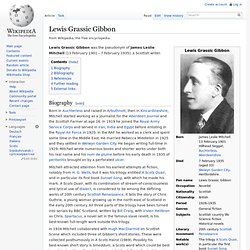
Biography[edit] BBC Two - Writing Scotland - Lewis Grassic Gibbon. Lewis Grassic Gibbon: Biography on Undiscovered Scotland. Lewis Grassic Gibbon lived from 13 February 1901 to 7 February 1935.
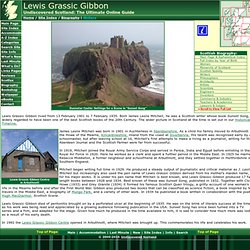
Born James Leslie Mitchell, he was a Scottish writer whose book Sunset Song, is widely regarded to have been one of the best Scottish books of the 20th Century. Lewis Grassic Gibbon. Born: 1901 in Auchterless, AberdeenshireDied: 1935First Book:Hanno: Or the Future of Exploration (Kegan Paul, 1928) Lewis Grassic Gibbon was born in 1901 in Aberdeenshire as James Leslie Mitchell.
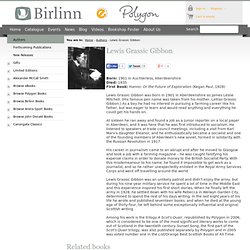
(His famous pen name was taken from his mother, Lellias Grassic Gibbon.) As a boy he had no interest in pursuing a farming career like his father, but was eager to learn and would read anything and everything he could get his hands on. At sixteen he ran away and found a job as a junior reporter on a local paper in Aberdeen, and it was here that he was first introduced to socialism. Lewis Grassic Gibbon - Books From Scotland. (born 1901 - died 1935) - Aberdeenshire Lewis Grassic Gibbon was born James Leslie Mitchell in 1901 in Aberdeenshire and grew up in Arbuthnott in the Mearns.
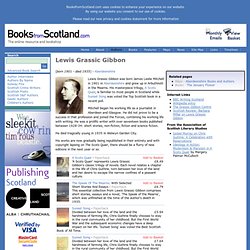
His masterpiece trilogy, A Scots Quair, is familiar to most people in Scotland while Sunset Song was voted the Top Scottish book in a recent poll. Mitchell began his working life as a journalist in Aberdeen and Glasgow. He did not prove to be a success in that profession and joined the Forces, combining his working life with writing. He was a prolific writer with over seventeen books published between 1928-34: short stories, non-fiction, fiction and science fiction. Lewis Grassic Gibbon. SRSM Articles - Lewis Grassic Gibbon. (Alan Stewart) Lewis Grassic Gibbon was born (as James Leslie Mitchell) in Auchterless, Aberdeenshire on 13 February 1901.
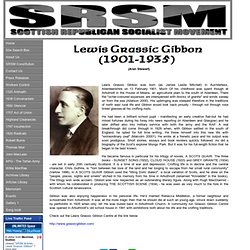
Much Of his childhood was spent though at Arbutnott in the House of Means, an agricultural plain to the south of Aberdeen. There the "ocher-coloured expanses are interspersed with blocks of granite" and winds sweep on from the sea (Allatson 2000). His upbringing was steeped therefore in the traditions of north east rural life and Gibbon would look back proudly - through not through rose tinted glasses-at his crofting roots. He had been a brilliant school pupil - manifesting an early creative flair-but he had mixed fortunes during his foray into news reporting (in Aberdeen and Glasgow) and he later drifted also into military service with both the army and the RAF. He became famous in particular for his trilogy of novels, A SCOTS QUAIR. Scottish Review: Books. Biography James Leslie Mitchell, 'Lewis Grassic Gibbon' (1901-35), was born and brought up in the rich farming land of Scotland's North-East Coast.
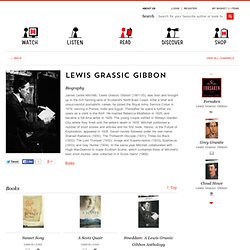
After a brief and unsuccessful journalistic career, he joined the Royal Army Service Corps in 1919, serving in Persia, India and Egypt. Sunset Song. Sunset Song is a 1932 novel by the Scottish writer Lewis Grassic Gibbon.
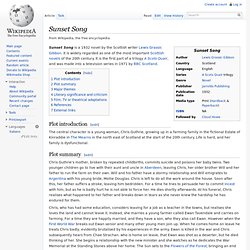
It is widely regarded as one of the most important Scottish novels of the 20th century. It is the first part of a trilogy A Scots Quair, and was made into a television series in 1971 by BBC Scotland. Plot introduction[edit] Sunset Song. Sunset Song. Free texts and images.
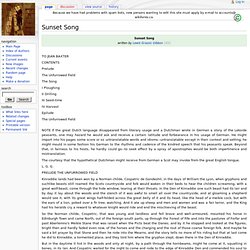
Prelude The Unfurrowed Field The Song I Ploughing II Drilling III Seed-time IV Harvest Epilude NOTE If the great Dutch language disappeared from literary usage and a Dutchman wrote in German a story of the Lekside peasants, one may hazard he would ask and receive a certain latitude and forbearance in his usage of German. The courtesy that the hypothetical Dutchman might receive from German a Scot may invoke from the great English tongue. Kinraddie lands had been won by a Norman childe, Cospatric de Gondeshil, in the days of William the Lyon, when gryphons and suchlike beasts still roamed the Scots countryside and folk would waken in their beds to hear the children screaming, with a great wolf-beast, come through the hide window, tearing at their throats.
But in the daytime it hid in the woods and only at night, by a path through the hornbeams, might he come at it, squatting in bones, in its lair. Inky poo, your nose is blue, You're awful like the Turra Coo. Sunset Song - Scotland's Best Read - News - Canongate Home. Why Everybody Needs Smeddum. Printer friendly version (pdf) Lewis Grassic Gibbons Smeddum, the tale of the Menzies family in rural north-east Scotland, is a beautifully crafted, and really satisfying short story.
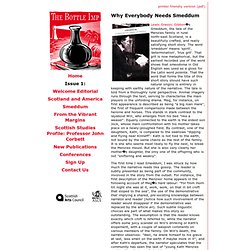
The word 'smeddum' means 'spirit', 'determination', 'true grit'. That grit is now metaphorical, but the earliest recorded use of the word shows that smeodoma in Old English was used as a gloss for the Latin word polenta. That the word that forms the title of this short story should have such natural origins is entirely in keeping with earthy nature of the narrative. The tale is told from a thoroughly rural perspective. The first time I read Smeddum, I was struck by how much the narrative reads like gossip.
The heroine, Meg Menzies, is Gibbons answer to Austens Mrs Bennet. The ending of Smeddum is breathtaking, and I won't spoil it for those of you in the enviable position of being able to read this little gem for the first time. Graeme Trousdale University of Edinburgh graeme.trousdale @ ed.ac.uk. Lewis Grassic Gibbon’s Sunset Song. There are writers you will enjoy reading, sure enough, but there ones also that the sheer joy of the flow of words will make you wish you could shake them by the hand.
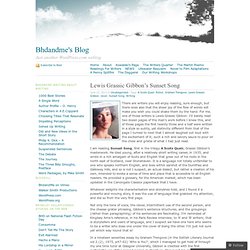
For me, one of those writers is Lewis Grassic Gibbon. I’d barely read two dozen pages of the man’s work before I knew this, and of those pages the first twenty three and a half were written in a style so subtly, yet distinctly different from that of the page I turned to next that I almost laughed out loud with the excitement of it; such a rich and savory sauce to pour on the chew and gristle of what I had just read. I am reading Sunset Song, first in the trilogy A Scots Quair, Grassic Gibbon’s masterwork.
He died young, after a relatively short writing career, in 1935, and wrote in a rich amalgam of Scots and English that grew out of his roots in the north east of Scotland, near Stonehaven. In a nineteen seventies essay by Graham Trengove (in the Sottish Literary Journal vol 2 (2), 1975, p47-62) ‘Who is You?’ Like this: The Grassic Gibbon Centre. The Grassic Gibbon Centre - Laurencekirk.